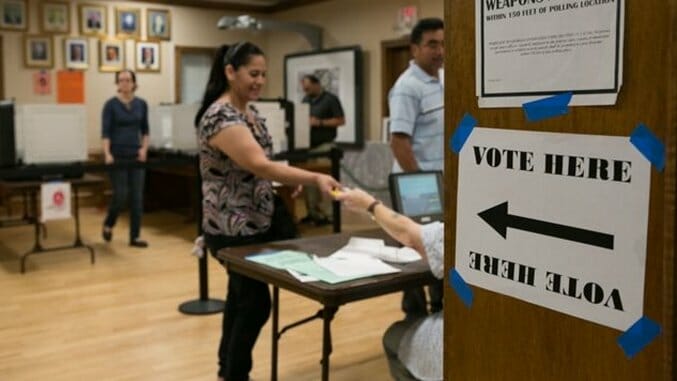Hackers Altered 2016 Voter Rolls and Stole Private Data on U.S. Citizens
Photo by Jessica McGowan/Getty Politics Features Russain Interference
TIME dropped a bombshell report today that should be getting more attention than it currently is. Here is the tl;dr version of a story that you should read in its entirety.
The hacking of state and local election databases in 2016 was more extensive than previously reported, including at least one successful attempt to alter voter information, and the theft of thousands of voter records that contain private information like partial Social Security numbers, current and former officials tell TIME.
This new report states that officials have not confirmed these intrusions were made by Russian hackers, but in light of the leaked NSA document which concludes that the government knew Russian military intelligence had conducted an attack on our voter rolls, it’s difficult to see this latest report as unrelated. It looks like a wider view of the NSA’s findings which assert that “the actors likely used data obtained from operation to create a new email account and launch a voter registration-themed spear-phishing campaign targeting U.S. local government organizations.”
Additionally, investigators are examining whether a link exists between these hacks and the Trump campaign.
Congressional investigators are probing whether any of this stolen private information made its way to the Trump campaign, two sources familiar with the investigations tell TIME.
We can confirm this because the House Intelligence Committee wants to interview Brad Parscale—the digital director for Trump’s campaign. If there was collusion between the Trump camp and the Russians, this would be one of the most likely areas for it to happen based on what we know to date.
Bloomberg reported that at least 39 U.S. states were hit by Russian hackers, so if this new TIME report is detailing hacking operations that didn’t come from the Russians, then this is a brand new development in the case. Occam’s Razor dictates that the simplest explanation is usually the correct one—so in that sense, the intrusions that TIME is detailing likely come from Russia, and this is an additional supplement to both the Bloomberg report and the leaked NSA document.
There is zero evidence to date that there was any collusion between the Trump campaign and the Russians, but given that the special investigative unit headed by former FBI director Robert Mueller is seriously digging into that possibility, the absence of evidence does not mean that there is evidence of absence. If there was collusion between the Trump campaign and the Russians, one half of the equation has already been firmly established through the NSA leak and the TIME and Bloomberg reports. All Trump would need to do is connect his and the RNC’s voter data to the voter data that the Russians hacked, and the Kremlin would have a very accurate idea of which voters to target with their disinformation campaign. On the flip side, this information hacked from the voter rolls could help the Trump campaign in their voter targeting operations.
It’s very possible that Russia’s widespread “fake news” operation to dump a bunch of nonsense on to Facebook and Twitter was simply an ambiguous approach designed to sow chaos—but if you look at what the Russians have done in Europe, this broad and unspecific attack doesn’t quite square up with their strategy to disturb the status quo. Per NBC News:
In December, Russia’s ruling party signed a five-year “cooperation agreement” with Austria’s anti-immigrant Freedom Party, led by Norbert Hofer.
Moscow’s entreaty to Austria comes only two years after a Russia-backed bank extended a nine million euro loan to [Marine] Le Pen’s National Front. Facing two competitive elections this year, Le Pen has considered going back to a Kremlin-backed bank to fill her party’s $21 million shortfall.
In Europe, Putin has directly supported as many candidates opposed to the Western status quo as he can, and the Kremlin has created an entire network of NGOs devoted to supporting Russia-friendly politicians. A report titled “The Bear in Sheep’s Clothing” commissioned by the Wilfried Martens Centre for European Studies (an EU think tank) described one NGO called the Eurasian Observatory for Democracy and Elections (EODE) as such:
The organisation has strong links to the European far right. The organisation invites members of European extreme-right parties to monitor electoral procedures. It is funded and headed by Belgian neo-Nazi Luc Michel, who is a follower of the Belgian neo-Nazi politician Jean-Pierre Vandermissel. According to Shekhovtsov, EODE is only a drop in the ocean of cooperation between the Kremlin and extreme right. The organisation has offices in Brussels, Paris, Moscow, Sochi and Chisinau. However, it does not state the exact addresses of its offices.
The fact that a hostile government successfully altered the voter rolls is a watershed moment for American democracy. Yet our president doesn’t seem to view it as a source of serious concern. In fact, Donald Trump is still trying to ease the sanctions placed on the Kremlin for their interference in our election. There is zero hard evidence tying the Trump campaign to the Russians—let alone Trump himself—but his obsession over this “fake” investigation and his aversion to saying anything negative about the Kremlin are the most compelling pieces of evidence that we have that collusion may have happened. Best case scenario: our elections are alarmingly nonimmune to foreign influence. If our far-right groups follow the path of Europe’s, the worst case scenario includes charges of treason.
Jacob Weindling is a staff writer for Paste politics. Follow him on Twitter at @Jakeweindling.